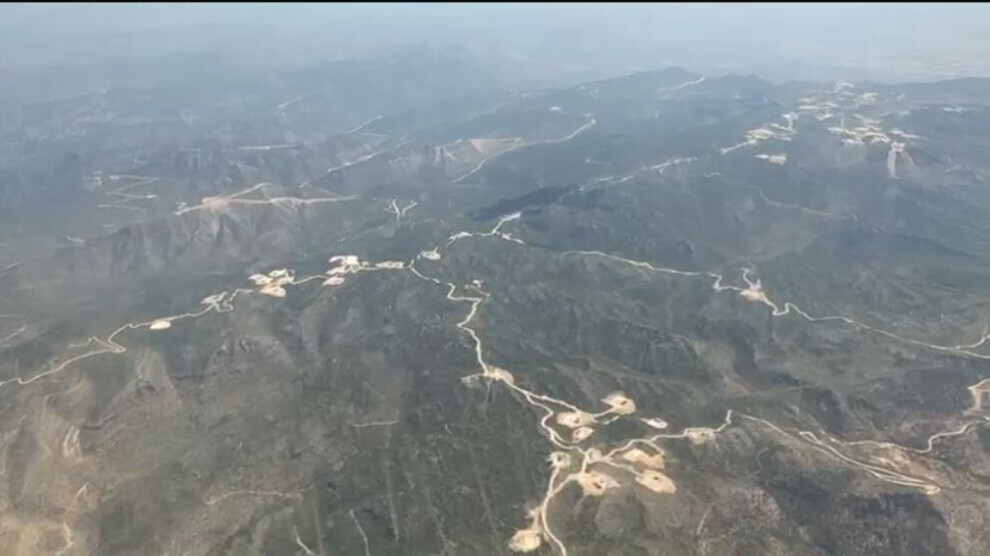Zeki Irmez: A systematic ecocide is unfolding in Botan
Zeki Irmez denounced the state-led deforestation in Botan as a deliberate and systematic act of ecocide.
Zeki Irmez denounced the state-led deforestation in Botan as a deliberate and systematic act of ecocide.

The environmental destruction in the Botan region in recent years goes far beyond deforestation. A series of dam projects, road constructions for military purposes, oil exploration activities, and bans imposed under the pretext of “security” have not only devastated natural habitats but also forcibly displaced local communities from their lands.
Zeki Irmez, MP for Şırnak (Şirnex) from the Peoples’ Equality and Democracy Party (DEM Party), describes this multifaceted assault as “a systematic policy of destruction against nature and life, carried out directly by the state.”
This policy is not new, it is the continuation of a century-old tradition
Zeki Irmez emphasized that the environmental destruction in Botan is not a recent development but rather a continuation of the state’s long-standing security-oriented policies toward Kurdish regions.
“This is the product of a century-old state mentality, regardless of religion,” Irmez stated, recalling how, in the 1990s, policies ranging from village burnings to forest fires inflicted deep harm on both the people and the land of Botan.
Deforestation surged after 2018
Irmez pointed out that since 2018, these policies have become far more systematic and intensified. He said, “Tree cutting has spread across nearly every part of the Botan region. According to research, more than 10 percent of the region’s forests have been destroyed, and the deforestation continues.”
He added that the areas experiencing the heaviest destruction include Besta, Gabar, Belega, Silopi (Silopiya), and the Melesa and Hemka regions of Beytüşşebap(Elkê).
Dams, embankments, and depopulated villages
Zeki Irmez explained that seven embankments constructed along the Uludere (Qileban) line under the pretext of security have led to the evacuation of surrounding villages and widespread deforestation in the area.
He noted that these embankments, which still continue to hold water, have disrupted the ecosystem and displaced local residents. In areas that include historic villages such as Hisar and Çağlayan in the Cizre (Cizîr) district, deforestation has been ongoing for many years due to the construction of the Cizre Dam.
They are cutting down all the trees under the name of renewal
Irmez rejected the Regional Directorate of Forestry’s claim that the deforestation is part of a "renewal" effort, stating that on-site observations show not only old trees but also young and newly sprouted ones are being cut down.
Irmez said, “In the footage and during our field inspections, we clearly see that even small, young trees are being cut. Therefore, these actions cannot be legitimized under the guise of ‘renewal.’”
Profit motives also drive the deforestation
Irmez noted that the deforestation is not carried out solely for security purposes but also serves profit-driven interests. He shared the following observations:
“There is a profit chain that extends from village headmen who sign logging contracts with the Provincial Directorate of Forestry to certain military officials and subcontractor companies. This is a very serious allegation, and we are continuing our investigations.”
Oil in Gabar, bans in Botan
Irmez stressed that the oil exploration activities launched in 2021 on Mount Gabar have caused severe environmental destruction. He stated that companies are recklessly damaging forested areas.
He also pointed out that the bans imposed every 15 days by the governor’s office have prevented residents from accessing their villages, gardens, and water sources. Irmez said, “Not everyone who applies for permission is granted it. This cuts people off from their livelihoods. Many water sources, forests, and gardens have already been destroyed.”
Forests were destroyed during the construction of 500 kilometers of road
The Ministry of Agriculture and Forestry has reported the construction of nearly 500 kilometers of new roads in the region. However, Zeki Irmez drew attention to the environmental cost of these projects, stating that thousands of trees were cut down, forest ecosystems were fragmented, and hills were practically flattened in the process. He said, “This is not merely an infrastructure project. It is a direct assault on nature.”
Irmez underlined that despite the government’s occasional calls for peace and normalization, such discourse has no reflection in the Botan region. He said, “The same security-centered policies continue, and the same environmental destruction is being carried out. This cannot be called peace.”
The people of Şırnak are angry, but the resistance must grow
Zeki Irmez concluded his remarks by emphasizing that the people of Şırnak are deeply angered by the deforestation and environmental devastation, and that this reaction must evolve into stronger collective action: “Civil society organizations in Şırnak are raising their voices and taking action, but this is not enough to stop those profiting from destruction or the state policies enabling it. This is not just a local issue. Environmental organizations, ecology movements, and concerned citizens across Turkey must join this outcry. If this pace continues, there will soon be no trees left in Botan. Our ecosystem, our living spaces, and our history are being destroyed.”